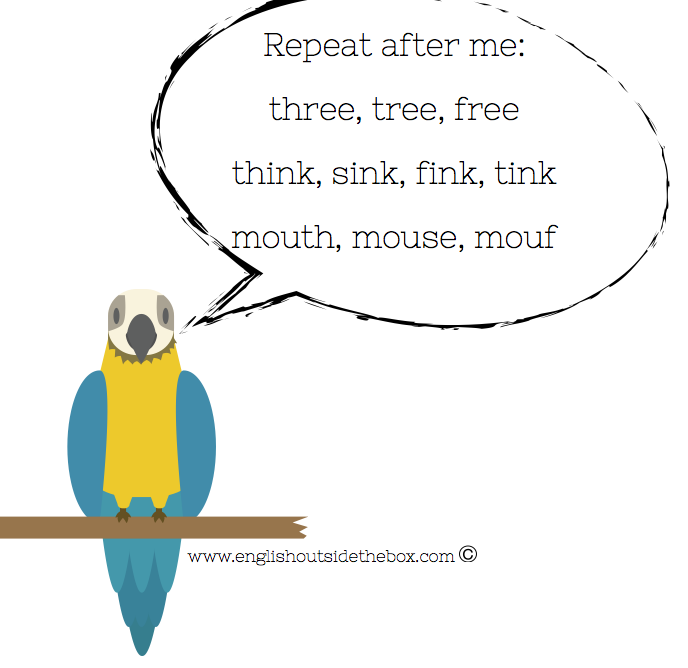Minimal Pairs: Pronunciation Problems with TH
There are many parts that are equally important to speaking English fluently. Some of the things we’ve reviewed recently on English Outside the Box have been vocabulary (words of the weekend) and grammar, specifically the future tense. However, knowing what to say, is just as important as knowing HOW to say it. Speaking with accurate pronunciation is incredibly important, and doing so can prevent miscommunication, and even embarrassment.
Minimal pair are words that are extremely similar, but differ in one unique sound. These sounds are often confused by language learners, so can create difficulty when speaking and listening. There are many minimal pairs, both vowels and consonants; however, today we’re only focusing on “th” “f” “t” and “s.” Yes, it is incredibly common for the “th” sound to be confused with these sounds, depending on native languages.
Next, let’s review the video for you to see and hear how these sounds should be pronounced.
Now it’s your turn to practice! Focus on the difference in all of these sounds….
Sometimes multiple words exist, that are legitimate words with minimal pairs: three, tree, free. Other times, words don’t exist, so you’ll just be making up words as you communicate: mouth, mouf.
It’s also possible that multiple words, that are minimal pairs, can logically make sense in a sentence. So, mispronouncing the words can definitely cause confusion. Take these examples into consideration:
— I want three tickets to the game.
— I want free tickets to the game.
In one of these sentences, you want multiple tickets. In the other, you’re a free loader.
— I don’t want to think.
— I don’t want to sink.
In one of these sentences, you don’t want to use your brain, and the other you don’t want to float to the bottom of water.
Practice with the following sentences:
- Thirty-three thieves thought their brothers thought they were thoughtful, but they thought wrong because they are thieves.
- The mouse’s mouth is sore, thick, and I think it’s sick.
- Thelma thinks that three free trees are available on Thirty-third street.
- Ruth is on the roof and thinks: sing a thing, pass the path, and thank a tank.
Below are some additional minimal pair difficulties, and some of the languages that I’ve come across that have the biggest challenges. This list, of course, doesn’t include everyone within these languages and I apologize for forgetting the many…many other languages out there. These are just what I’ve had the most contact with lately. These lessons will come later….
R/H – Portuguese
V/W – Russian
R/L -Korean, Japan
S- Spanish, Portuguese
P/B – Arabic
B/V- Russian, Korean
V/F – German
THANK YOU.
Did this post help you with your pronunciation? Share with a friend, knowledge is power….so help spread the power!
If you haven’t yes, subscribe to my blog to always be updated with new English information.



[…] the 2015 year. 19 Pronunciation Practice! Review minimals pairs on this blog! Specifically TH, and the long versus short E sound (Italian in Malta anyone?), and more. Review pronunciation […]
What is really difficult for German speakers of English is the ‘th’ followed by an ‘r’, like in three. And in German, we don’t have a sound that is pronounced with the tongue between our teeth, so the ‘th’ is difficult in general.
I sometimes simply don’t dare to put my tongue that far outside, it’s a little bit as if you would poke your tongue out at someone